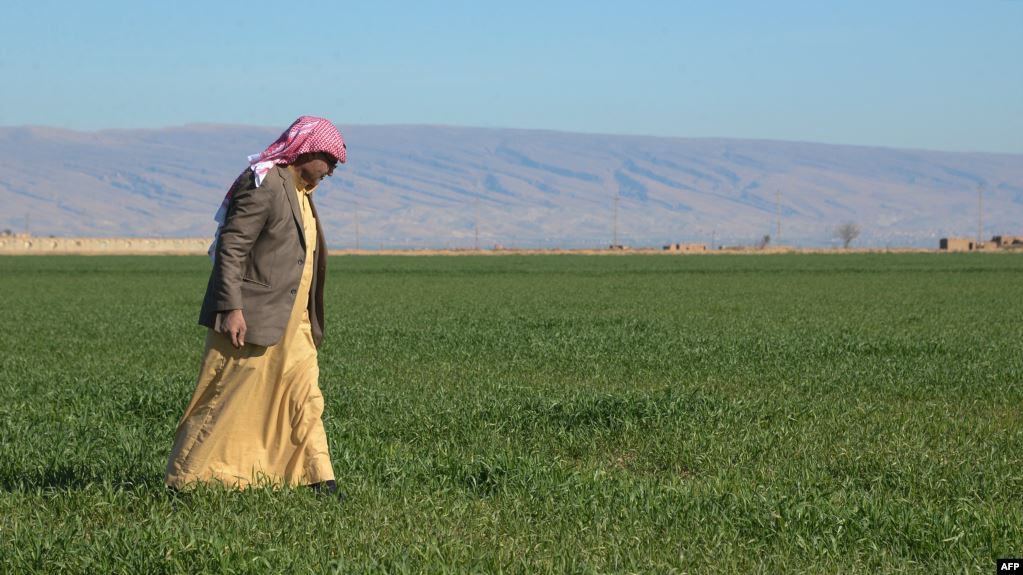IS Militants Target Kurdish Farmers in Disputed Iraqi Territories

In a bid to extort revenues from local farmers during the harvest season, Islamic State (IS) militants are threatening to set fire to thousands of acres of wheat fields in territories disputed between the Iraqi government and the Kurdistan region, according to local officials.
The militants, hiding mostly in caves and mountains of a large territory between the Iraqi forces and Kurdish peshmerga, pour into small towns and villages at night and ask local residents to pay a religious tax known as zakat or find their crops destroyed the next day, peshmerga Maj. Gen. Ziryan Shex Wasani told VOA.
"IS fighters have told farmers and workers to give them 15% of their harvest revenues or their wheat fields and hay will be set to fire," said Wasani, adding that hundreds of acres of land have already been set ablaze in Makhmour town, 60 kilometers (37 miles) southwest of Irbil governorate.
Wasani said IS is taking advantage of the security gap created by the lack of cooperation between the Iraqi forces and Kurdish peshmerga in the disputed areas.
The vast disputed territories, consisting of Kirkuk and parts of Nineveh, Saladin and Diyala provinces, have been a point of contention between the central government and the Kurdistan Regional Government (KRG) for decades as both sides claim ownership over them.
The Kurdish peshmerga held the area during IS emergence in 2014 but were forced out shortly after a Kurdish referendum for independence was held in September 2017. The two sides then stopped joint counter-IS operations.
Kurdish officials say they fear the continuation of the fires could ignite violent clashes between Kurdish and Arab residents of the area, especially as the Kurdish farmers say only their fields are targeted while Arab farmers' fields are spared.
WATCH: Unknown Militants Target Kurdish Farmers
According to the Iraqi Ministry of Agriculture, about 500 hectares (1,185 acres) of farmland have been scorched in recent weeks across the disputed territories as well as al-Najaf and al-Diwaniyah governorates.
Opposing statements
The ministry has not disclosed any information about the mysterious fires in the disputed territories. In a statement, however, it said the scorches in al-Najaf and al-Diwaniyah governorates were prescribed burns performed to improve the quality of the land.
Authorities use terms such as "prescribed burns" or "controlled burns" to refer to intentional fires set to fields in order to manage weeds, reduce wildfire risks and restore nutrients.
"The ministry asserts that these agricultural practices are not within the framework of sabotage or damage to the national agricultural economy or food security, but practices based on scientific aspects, where the residue of the burned grass is used to add nutrients for the other crop, such as rice," the ministry said in its statement Monday.
Shortly after the ministry's statement, the Iraqi parliament's agriculture committee denied the fires were controlled burns, adding they were "obvious sabotage and terrorism."
"The local agricultural products have been subjected to fierce attacks recently, with the latest being arson against wheat and barley fields in six provinces in a systematic manner," Salam al-Shamari, the head of the committee, said in a press conference Monday.
Al-Shamari claimed the fires were directed in a "foreign conspiracy" against Iraq and urged the government to thoroughly investigate "the new terrorism against the Iraqi economy." He added local farmers' eggs, dairy products and fish were targeted
severalmonths ago
Earlier in the spring, the Iraqi Ministry of Agriculture predicted its grain production would rebound significantly because of abundant rain and snowmelt in 2019, following a difficult and dry 2018. The ministry says it has so far purchased about 883,000 tons of wheat from local farmers in nine provinces.
The U.S. Department of Agriculture estimates Iraq's wheat production for this year will reach 4.97 million tons, an increase of 32% from last year. It also says that wheat consumption for 2019-20 will reach 6.9 million tons, an increase of 3.5% from the previous year.